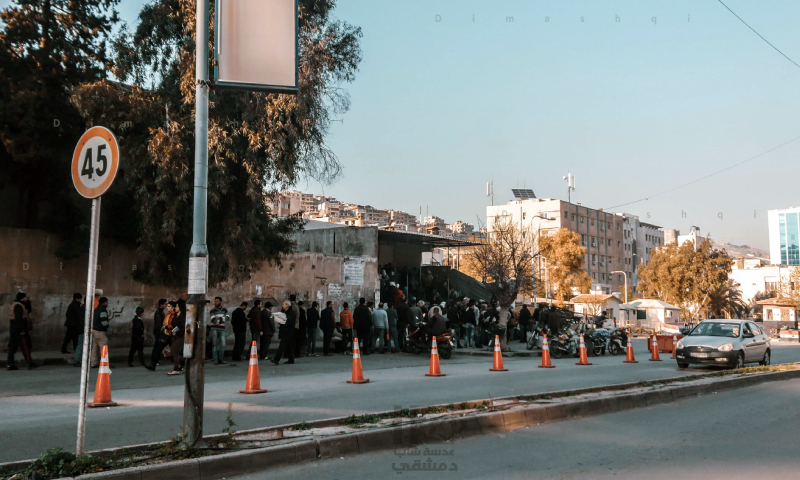



Enab Baladi – Zeinab Masri
According to economic logic, salary increases raise the general price level and contribute to further inflation. In the Syrian case, the regime government raises prices before increasing salaries, denying citizens any opportunity to enhance their living conditions.
The Syrian government has adopted this policy of raising prices ahead of salary increases two times during the current year.
On 12 December, Syria’s Ministry of Internal Trade and Consumer Protection raised the price of subsidized gasoline by about 47 percent, bringing the price of 90 octane fuel to 1,100 Syrian pounds (SYP) per liter under the “smart card” distribution system.
The old selling price of the same octane rating was 750 SYP per liter.
The fuel price increase was reflected in transport fares and food prices. Syrian Officials stated that the prices of vegetables and fruits are also likely to increase to up to 15 percent.
On 8 December, the Ministry raised the price of the “tourist” bread bundle of one kilogram to 2,500 SYP after it was sold at 1700 SYP.
On 11 November, the Ministry priced unsubsidized diesel at 1700 SYP per liter and unsubsidized 90 octane gasoline at 2500 SYP.
On 15 December, the head of the Syrian regime, Bashar al-Assad, decreed an increase of 30 percent to the fixed salaries of civilian and military state employees.
On the same day, al-Assad issued another decree of a 25 percent increase to the retired civil and military state employees’ salaries.
A third decree by al-Assad stipulated evaluating compensations according to the laws and legislations on the basis of monthly fixed salaries and wages effect on the date of work performance.
On 11 July, two years after a salary and wage increase, the regime’s government announced a new decree of salary hike but raised prices of main food staples and fuel in advance under the pretext of a financing shortfall and high production costs.
Al-Assad’s July pay increase decree stipulated a 50 percent increase to state workers and a 40 percent increase to retired workers’ salaries. At the same time, the government raised diesel prices at 172 percent and bread, sugar, and rice prices at 100 percent.
Syrian economist Dr. Firas Shaabo told Enab Baladi that the recent increase in salaries would not help improve Syrians’ living conditions in the regime-controlled areas, as estimates by figures affiliated with the regime said that the Syrian family needs between 400,000 to 500,000 SYP monthly to live by.
Shaabo described the latest salary raise as having a “limited impact on Syrian’s living situations, considering that an effective raise must be around 300 or 400 percent.”
Shaabo pointed out that the inflation rate is sure to rise because the regime raised commodity prices before the salary increase, causing production costs to rise dramatically.
The regime government has also expressed its intention to reduce, lift, or end subsidies for about one-quarter of Syrians, revealing the depth of the economic crisis in regime areas.
This comes amidst a lack of diesel, electricity, and essential commodities, the absence of an investment environment, the prevalence of financial monopoly, and imposition of royalties by regime’s thugs on transported goods.
Today there is no “Hope in Work,” (Bashar al-Assad’s latest presidential campaign’s slogan), Shaabo said, adding that the slogan al-Assad should be promoting nowadays must be “Hope is in Escape,” at a time when many United Nations reports are talking about a looming famine in Syria.
The UN indicators tell that the situation in Syria is only heading for the worst.
According to Shaabo, the pay hike will affect exchange rates, explaining that commodities’ values decrease in cases of increased supply; thus, the cash flow in markets will further devalue the Syrian pound.
He added that the regime is aware of this economic fact; however, the government wants to send a message through the salary increase that it is there for citizens and that the regime president has “blessed Syrians in his regions with this salary raise.”
The US dollar exchange rate to the Syrian pound has seen some stability in the black market since last April, with the dollar reaching 3585 Syrian pounds, according to the Syrian Pound Today website. Meanwhile, the regime’s government kept the official exchange rate stable at 2252 Syrian pounds to the US dollar.
On 14 December, the Secretary of the Syrian People’s Council, Salloum al-Salloum, told the local Sham FM radio station that the state payroll in the 2022 budget, approved by the Council on 13 of the same month, amounts to 1,586 billion Syrian pounds.
Most Syrians residing in regime-held areas rely on more than one source of income because of low salary values and purchasing power. They overcome high prices and living difficulties with the help of remittances coming from abroad or by taking a second job.
Some destitute families have to abandon basic commodities in bid to lower their expenditures.
The UN World Food Programme (WFP) Executive Director, David Beasley, warned against the “drastic” measures people are forced to take because of hunger and poverty in Syria.
In a statement released on 12 November, Beasley said that conflict, climate change, the repercussions of the novel coronavirus (COVID-19) pandemic, and rising costs are “pushing people beyond their limits.”
“History has shown us that if we do not help people before they become destitute, they will take drastic measures, and we will see mass migration,” warned Beasley.
According to the WFP, a record number of Syrians are food insecure, and 12.4 million people struggle to access a basic meal, an almost 60 percent of the country’s population. This is the highest number recorded in the history of Syria, with an increase of 57 percent (4.5 million people) during 2019.
if you think the article contain wrong information or you have additional details Send Correction